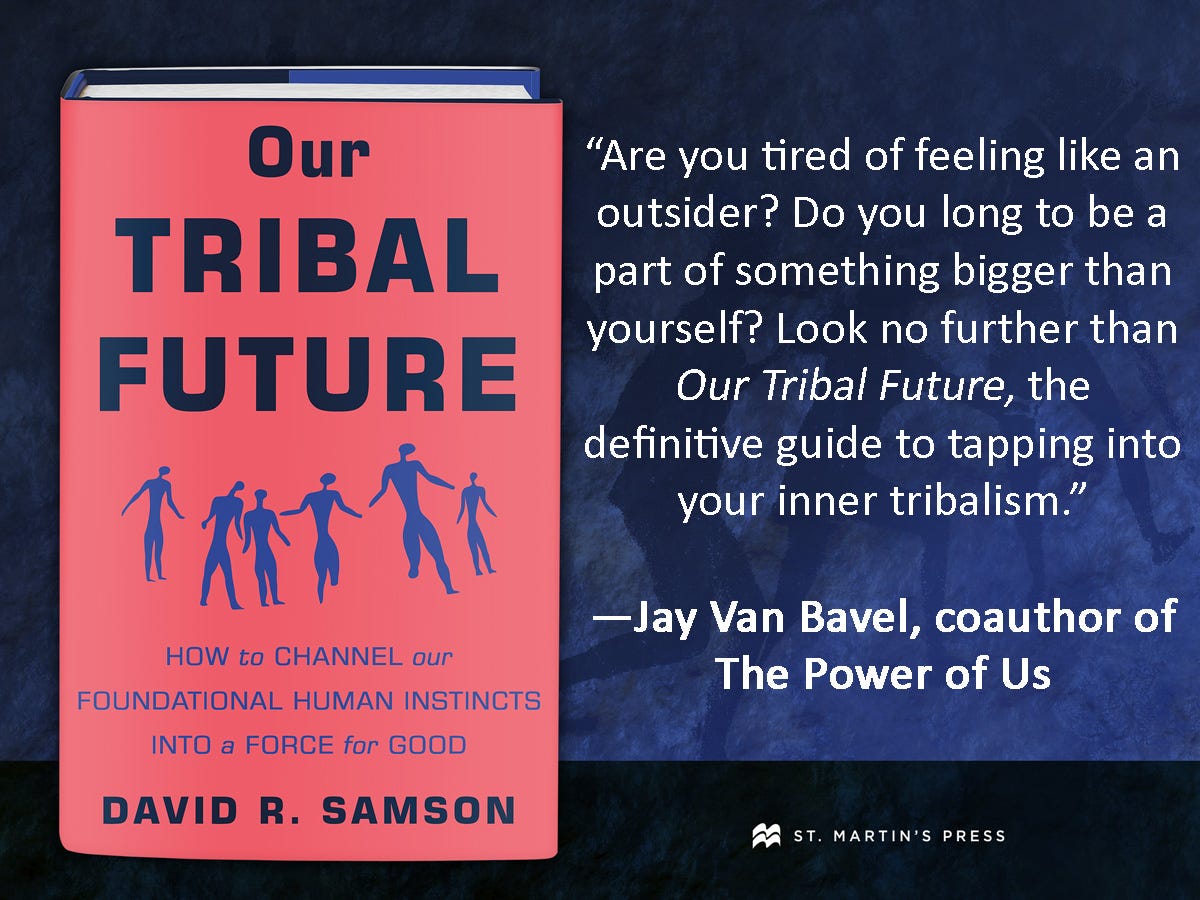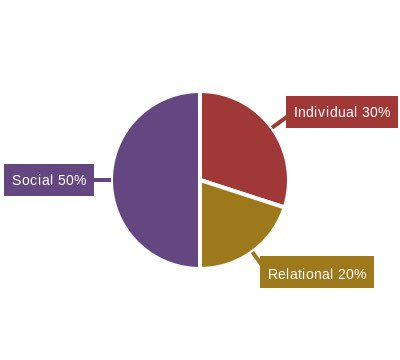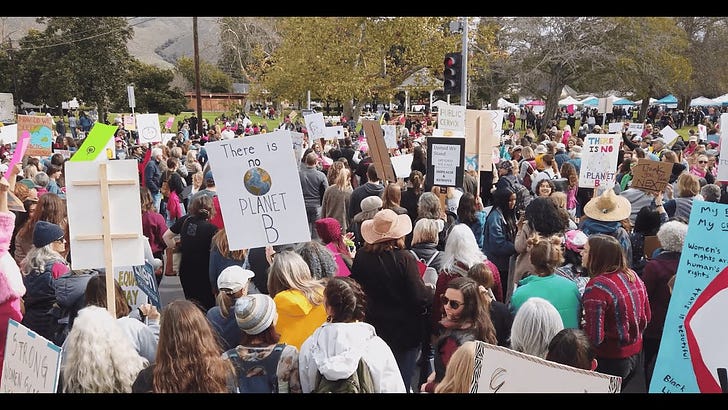INTERVIEW: David Samson on OUR TRIBAL FUTURE
Issue 75: Anthropologist David Samson explains the origins of our tribal instinct, the Trust Paradox, and how to channel human nature into a force for good
Too often, when people hear the word “tribalism”, they think of bigotry, xenophobia, and sectarian violence. Others may think of in-group members and a sense of loyalty and connection. To evolutionary anthropologist David R. Samson it is all of the above. In his view, tribes are a human invention to answer the question: “Who can I trust?” No other species on the planet has this amazing capacity at their disposal.
This week, we dive into the key ideas in David Samson’s new book, Our Tribal Future: How to Channel Our Foundational Human Instincts into a Force for Good, a book which explores a central paradox of our species: how altruism, community, kindness, and genocide are all driven by the same core adaptation.
Professor Samson engages with cutting-edge science and philosophy, as well as his own field research with small-scale societies and wild chimpanzees, to explain the science, ethics, and history of tribalism. David’s lab focuses on studying the link between sleep and human evolution among lemurs, zoo orangutans, wild chimpanzees, and humans living in different types and scales of societies.
Jay received an advance copy of the book and wrote a blurb for the book:
Check out David’s interview below:
What does your book teach us about social identity or group dynamics?
There is a central paradox embedded in the code of group dynamics, and the understanding of this paradox is the key to unlocking prosociality at every level of human interaction. I call this the Trust Paradox. The resolution of the paradox is the ultimate moral quest to understand how a human mind, that was crafted to work with people we know, evolved the instinct to work with people we don’t.
Group dynamics is all about trust. Ask yourself, “in whom do you put your trust?” Evolution has crafted several answers, yet one solution to the problem is completely unique in humans. We innovated tribes. A tribe is a meta-group – an intersubjective belief network – that uses symbols as tokens of identity signaling membership. It serves the function of bootstrapping cooperation amongst strangers within the shared mythology of a beyond face-to-face social network. It is a type of secret society, where the signals of coalitionary alliance serve as the ‘secret password’ to gain the rights, responsibilities, and benefits of the collective “imagined order.” No other species on the planet has this amazing capacity at their disposal.
What is the most important idea readers will learn from your book?
The most important and shocking revelation is the unprecedented power of our “Tribe Drive” (i.e., coalition cognition) to warp human perception. There is an emerging line of thought in evolutionary psychology that evolution does not favor true “veridical” perceptions and that natural selection routinely drives them to extinction. Evolution isn’t about being true, it’s about crafting perceptions that enhance survival and reproduction.
Groups shaped our brains throughout evolution, and so we come to a stunning realization that our perceptions are shaped not by truth but our identity groups. For example, there is nothing more human than believing in collective narratives. These tribal narratives were the glue that kept our camps, bands, and tribal signals and symbols coordinated in collective action and resilient to a host of existential challenges. Like an optical illusion, group beliefs have this fantastical, strange, perception-warping property and the more it deviates from reality the more powerful a signal it is of collective identity. This explains most religious beliefs and their propensity to be paradoxical in nature. Think of the holy trinity for example. It defies logic that, all at once, a being can be three beings and one. But it’s a fantastic signal of coalitionary alliance. The more radical belief the stronger the signal that ‘we are one.’
Why did you write this book and how did writing it change you?
In the second part of the book I use applied evolutionary anthropology to guide readers with the latest science backed techniques to enhance cohesion in their own groups. One powerful tool is to leverage an ancient ancestral human practice to intentionally strengthen one’s social networks: ritual. Ritual has a raw and naked power, I’ve only recently begun to appreciate and revere. Its compelling magic has a precise function -- it standardizes actions coupled with symbols that encode the values and norms of an entire group. Every time we partake in ritual we perform a pattern of actions that conveys meaning and significance using identity signals of coalitionary alliance.
In other words, ritual is one of the most potent spells to cast to teach and learn how to signal your coalitions to the world. As a culture, I get the sense that we’ve become under-ritualized. Our societal rituals are stale and atrophied. They lack substance and spark. If applied, ritual is the best way to enhance the identity and purpose of your group and the end result is that you are harnessing a kind of rocket fuel for group cohesion. In my own life, to fight this social drift, I’m trying to work towards being intentional about my rituals.
What will readers find provocative or controversial about your book?
If tribalism is such a powerful force biasing the human mind to prefer one’s own tribe over another, then what does it mean for the future of humanity? The new science of cognitive immunology may point us in the right direction. This scientific framework understands mind viruses as not just metaphors but real, measurable things that adversely affect human wellness. The twenty-first century has been waylaid by ideological derangement. Extremist culture warriors dot the landscape in a winner-take-all attack on each of their enemies. Mass shootings (spurred by loneliness and social isolation), terror bombings (spurred by religious tribalism), and hate crimes (spurred by racist tribalism), are endemic; tribalist ideology is at the very center of the modern epidemic of bad ideas.
How do we inoculate ourselves against the tribe virus? Cognitive immunology is one of the most promising frameworks to deal with the existential threat of the “cultural immune disorder” currently inflicting our species’ societies. If the mind actually has an immune system that protects against parasitic, bad ideas, then we should also be able to inoculate it against the most pernicious forms of mind viruses.
Do you have any practical advice for people who want to apply these ideas (e.g., three tips for the real world)?
1. Create rituals. Rituals are a powerful way to enhance group cohesion. They can be anything from regular meetings to shared meals to team-building exercises. The important thing is that they are meaningful to the group and that they help to create a sense of shared identity and purpose.
2. Be mindful of tribal signals. They are everywhere, but we are, for the most part, not conscious of them. They effuse around us, and the computational powers of our brains are programmed to spend incredible amounts of energy processing them. These “who to trust” signals help our brains churn out predictive models of human behavior on the basis of these cues. Just as body language is an important component of human communication, so, too, is our tribal language.
3. Re-weight identity to be more face-to-face. Tribes are groups of strangers nested by symbols. Thus, any identity that has strangers in it is by definition a tribal identity. One way to increase health and wellbeing is to invest more of our energy into groups that are primarily face-to-face.
You can purchase Our Tribal Future here and follow David on Twitter here.
News and Updates
Do you tend to think of yourself and your identity socially, individually or relationally? Find out in our Identity Test for the WHO AM I CHALLENGE. Be sure to take the test yourself or share it with friends or co-workers in the next few weeks! We will share the overall results in a future newsletter.
Catch up on the last one…
Read Jay’s first person account of his day at the Astoria Film Festival as the director of our documentary!
The Power of Us at a Film Festival
This week, we’re bringing blogging back and taking you through a day in Jay’s life at the Astoria Film Festival! This past Sunday, we screened our documentary, The Power of Us: Protecting Democracy in a Time of Extreme Polarization to a general audience and Jay went to the festival in a brand new role: Director! Our film was produced by





